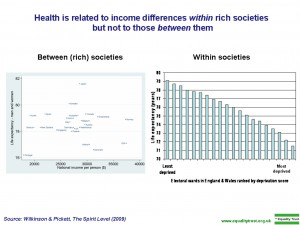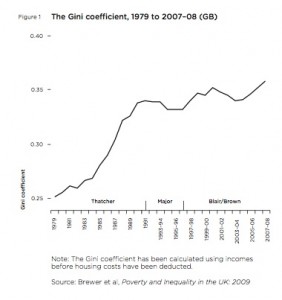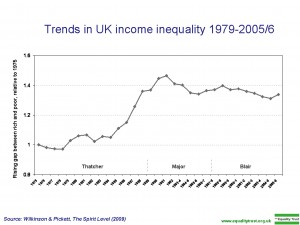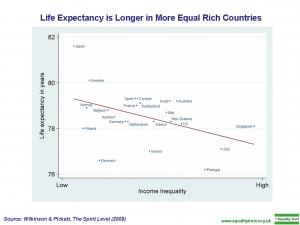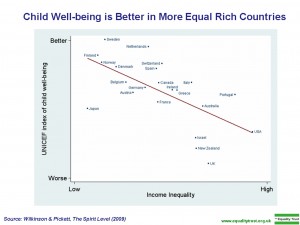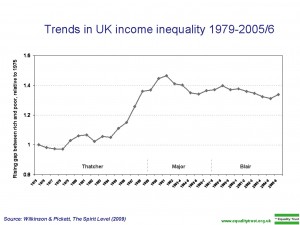Open Cities 15 Equality and Openness
Top of the pops
Like wasps around a jam pot, the main political parties are cramming around equality. They all love it, have it, do it. Why then has the UK one of the widest equality gaps, together with the USA, Australia and Portugal? Conversely to Scandinavian countries and Japan. With the election approaching they outbid each other with their virtuous solutions to make Britain a more equal, thus a healthier, safer and altogether happier society. Jam tomorrow.
Demos, an independent think tank runs ‘The Open Left’ project http://www.openleft.co.uk/events/ but gives a voice to all shades of progressiveness. The Spirit Level: Why Equality is Better for Everyone, written by Richard Wilkinson and Kate Pickett and published by the Equality Trust in 2009 argues that inequality is the root cause of many of society’s ills, based on persuasive empirical evidence.
Politics of fairness: equality in the UK
On 9 February, the three major political parties, labour, liberal democrats and conservatives staked out their position on equality with the support of Demos http://www.demos.co.uk/events/politics-of-fairness, One Society http://www.onesociety.org.uk/ and the Equality Trust http://www.equalitytrust.org.uk/.
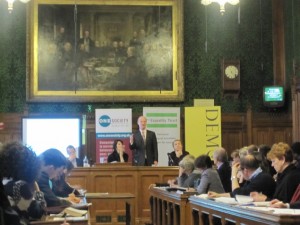
Dia 2 Meeting at the House of Commons on Inequality
It required intense attention and good will to put a paper wedge between the three views of James Purnell (lab), David Willetts (con) and David Laws (lib dem). They all championed themselves as advocates of equality. They all quoted but distanced themselves from the Gini coefficient which measures the gap between a country’s richest and poorest and which has risen steeply under Thatcher and grown ever since despite a decline under labour between 2000-2004.
Their argument is that other measures are more pertinent, such as the relative inequality within smaller communities at workplaces and in neighbourhoods, etc. (Max Wind-Cowie, Everyday Equality, Demos, con), the relative shift out of poverty of the lowest income groups and children in particular (Graham Cooke, Society of Equals, Demos, lab), and the need for minimum income standards by taxing wealth transmission without touching at top incomes (Julia Margo and William Bradley, Wealth of Opportunity, Demos, lib-dem).
Inequality in cities
There seemed to be consensus that inequality at national level also existed within cities, and the wider the gap, the higher social ills affecting all. Clearly, insufficient income, or inability to grasp equality of opportunity due to social class are reducing what cities have to offer. They thus are less open for these relatively deprived groups which may harbour resentment and spread conflict to the detriment of society at large.
The name of the game for labour is redistribution by ‘active equality’ as it recognises having been too hands off with the market and too hands on with the state. It aims at powerful people in a ‘reciprocal society’, a somewhat abstract notion to be implemented by sectoral bureaucratic measures, after thirteen years of operational power.
The problem with localism and confining ‘everyday inequality’ issues to small areas, proposed by the conservatives who claim that there is less resentment about large income gaps than about perceived marginal ones, is spatial segregation of inequality. Decentralisation and leaving the care of inequality to volunteers reminds laissez faire in a new guise.
Redistributing resources, capitalising disadvantaged families and improving services are the recipes of lib-dem, self appointed champions of equality since John Start Mill and his proposed cap on inheritance which they are now trotting out in a new form.
Promises, promises are met with skepticism by the electorate footing the bill of laissez faire across the board. Even the feeble measure introduced at five to eleven to adopt a single transferable vote system rings hollow, satisfying nobody throughout the political spectrum. As long as citizens are feeling disenfranchised they will have little incentive to become volunteers to help the less well off, active egalitarians, or subscribers to the depletion of their hard earned income and wealth.
Tackling equality by focusing on a single group, such as poor children, cannot produce the expected result, because, according to Wilkinson, the income gap has to be addressed comprehensively from top to bottom to be effective.
In a city like London, this would mean serious changes to the financial sector, and also to the remote power structure of governance at every level affecting equal opportunity of citizens. More plausible alternatives may emerge from the bottom up, such as those explored by ‘This is Not a Gateway’ discussed in a future post.

